
Developing Novel Therapies to Treat Brain Cancers

Tubulin therapies have successfully treated breast, lung, ovarian, thyroid, and prostate cancers…but not brain tumors.
How tubulin therapy works
The tubulin protein polymerizes to form microtubules, the molecular highways that shuttle materials from one part of a cell to another. When microtubule formation is disrupted, cancer cells arrest during the replication cycle and die.

We break barriers with safe and effective oral cancer therapy, penetrating the blood-brain barrier for global treatment.
Safety First
Many cancer therapies are highly toxic. Most therapies are given intravenously in clinical settings and cause many unwanted side effects. It is important to the Reglagene team to develop orally available, well-tolerated medicines for patients to use in the comfort of their own homes.
Blood-Brain Barrier (BBB) Penetrant
Only 2% of all marketable drugs can cross the BBB, a filter that prevents toxins and medicines from entering the brain. Reglagene’s brain cancer therapy crosses the BBB and has nearly the same concentration in peripheral blood as in the brain.
Well-Validated Target
Reglagene's first therapy attacks a highly validated cancer target, previously inaccessible in brain cancer owing to the BBB. Many therapies and drug-delivery systems have tried and failed to access this target in brain. Reglagene has found a way to make this possible.
Medicines for a Global Market
Reglagene accesses the advantages of what are known as small-molecule medicines. Benefits of small molecule medicines include: oral administration, low manufacturing costs, and well-traveled development and regulatory pathways.

